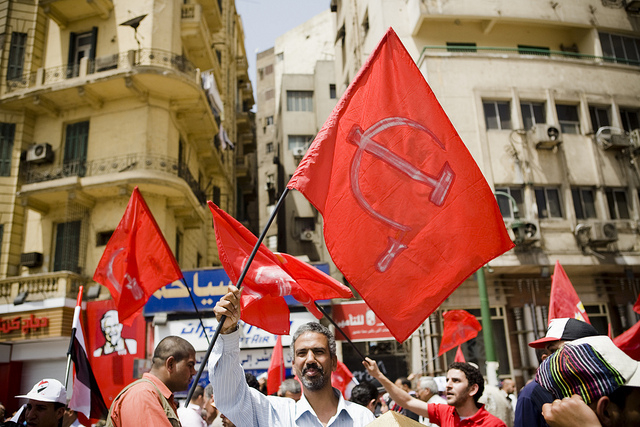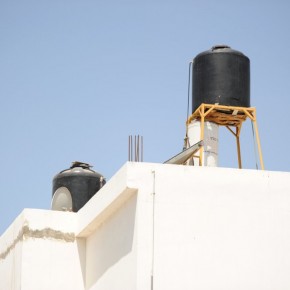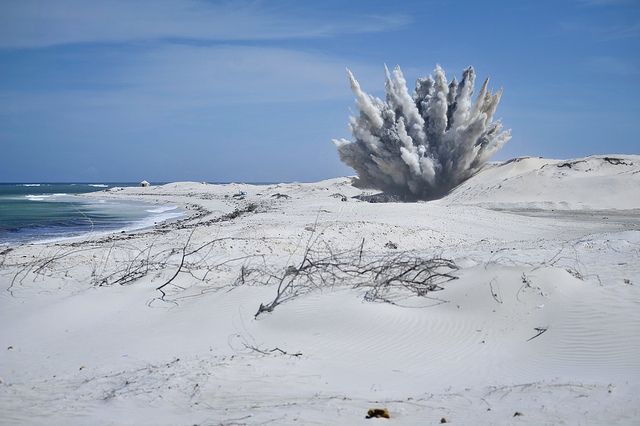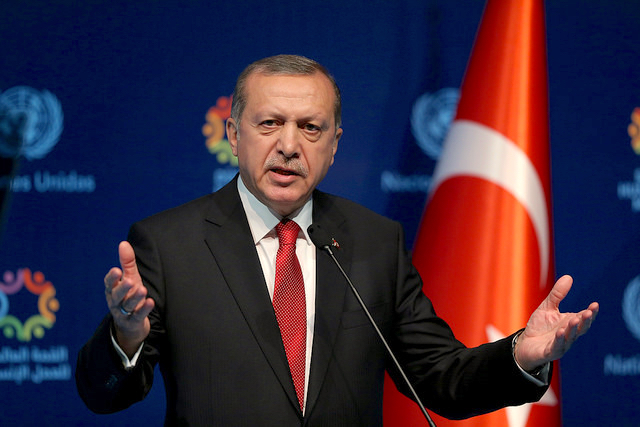For decades, there have been calls for a Protestant Reformation in the Muslim world. There’s something to it. Unfortunately, most press for a vaguely defined liberal secularism against an equally unclear Islamic backwardness. This can be particularly sinister when Muslims do it, since it contributes to a senseless dichotomy between secular elites and religious extremists that paralyzes the Islamic world.
Such debates may seem specific to the War on Terror. However, they’ve been occurring with varying amounts of intensity for centuries. At this point in history, it seems clear that a new form of Islamic practice is necessary, that mixes progressive politics and religious traditionalism. Tariq Ramadan is perhaps the best-known scholar advocating such a synthesis, pushing something redolent of the Catholic Liberation Theology of the 1970s and 1980s, within an Islamic framework.
It’s important to stress the parallelism here. Liberation Theology cannot just be copy and pasted across world religions. It is, after all, a fundamentally Christian event. Nonetheless, it advocates an approach to Biblical traditions, which can inspire: reinterpreting the social teachings of monotheistic religions through the lens of modern social justice politics.
Liberation theologians originally sought to challenge the Catholic Church in Latin America by recasting Christianity as a religion of the poor. Their main conclusion was that Catholicism needed to focus on serving the oppressed. They believed that this was the essence of the Gospels, and the root of Jesus’ teachings. Operating against the conservative idea of “last here, first in the Hereafter,” the argument was that caring for the marginalized is a necessary step towards salvation.
There’s no reason that Islam can’t have its own version of this theology. Unfortunately, the influence of Salafism has led Muslims to believe otherwise: that there is no room for re-imagining our religion, to meet our needs. Islam, as it was revealed, is exactly how it is meant to be practiced. Piety is more an issue of accommodation than it is interpretation.
Attempts to critically examine the faith under modern conditions are dismissed as bid’ah (“innovation.”) Literal readings of the Qu’ran and Hadith are considered to be the only cornerstones of Islamic practice. This is obviously hypocritical, since most Salafists do not abstain from adapting their religious practice to social media and state power, for example. But, that is what fundamentalists do. They use the present to impose the past.
Broadly speaking, such denial ignores the fact that Islam is a religion that has continuously adapted itself to the demands of history. For instance, the medieval scholar Ahmad ibn Taymiyyah responded to the Mongol invasions with a bevy of ideas related to philosophy, economics, and logical reasoning. Indeed, Islamic scholars always respond to periods of crisis with new ideas about how the ‘ummah (“community”) should function.
Modern Salafism began as part of a three-fold reaction to imperialism and Western capitalism in the late 19th century, which jostled for status as the force that would guarantee nahda (“renaissance”) for the Muslim world. The other two were pan-Arabism (as well as leftist ideology more broadly,) and liberal republicanism. Thus, today’s Islamic left is not doing anything new. Scholars like Ramadan are just responding to this current period of global crisis with a new take on Islam.

If it is to succeed, “Liberation theology” has to change in an Islamic context, because Muslim theology arguably does not exist. Theology is a fundamentally Christian concept that was born mainly from the recorded decrees of the Catholic Church as an institutional authority. There was a unity to its voice that made the body of writings known as “theology” possible.
Islam does something completely different. There is no Muslim Pope. The Shi’a tradition, which is most frequently compared to Catholicism, with its veneration of Ayatollahs, is paradigmatic of this difference. Religious authority is scattered, without any fixed clerical body. This lack of centrality was built into the religion because of a belief that learned discourse (ijtihad) and philosophy (kalem) was necessary in order to maintain the community through renewed understanding of its core religious texts.
This doesn’t mean that there is no unity to those who engage in ijtihad. Islamic discourse is based in the idea that the “oneness of Allah” (tawheed) also implies the universal oneness of humanity, and with it, the oneness of human dignity. The perspective is therefore more anarchist than it is hierarchical, with power being distributed as horizontally as possible.
The only authority that supersedes humanity is considered to be the sacred text itself in the Qu’ran (and, arguably, the Prophet’s example in the Sunnah.) This is an asset for Islam. Liberation Theology was severely constrained by a need for institutional realignment in the Catholic Church. Muslims do not need to confront this in the same way, because the problem is with rigid interpretations of the text itself, and which ones have been accorded power in the ‘ummah.
This is the problem with the Persian Gulf monarchies. Islam may not have a formal clergy, but many Muslims have been negatively affected by the growth of Salafism, which has been deliberately promoted by Gulf oil wealth in the past few decades. As a result, Islamic liberation theology must challenge much more than simply a worldview. It must also confront the political power it represents, in the form of these governments, and their religious ideology.
According to Ramadan, there are three main foci for such an Islam: (1) Individual consciousness; (2) inter-personal relationships in the community and society; and (3) the global economic system. These must be transformed simultaneously, though priorities can change from time to time.
Schooling is key. Tariq Ramadan argues that individual consciousness must be transformed through a comprehensive education that is aimed towards alleviating personal ignorance. This is in line with a great deal of Islamic philosophy, which emphasizes the seeking of knowledge as something that strengthens personal character.
It’s more than that though: Ramadan’s point is that literacy in a variety of topics makes it harder for a Muslim to be fooled. This is in direct contrast to the Zakir Naiks of the world, who cast doubt on scientific advancements like the theory of evolution. An educated and critical person is harder to dominate, and will have an easier time navigating lofty concepts like their need for personal dignity. Depending on their personality type, they may also benefit from the discipline of ritualistic lifestyle, such as through the five daily prayers.
The second area is explicitly political in nature. Ramadan argues that social relations need to be anchored in an understanding of the oneness of human dignity, which is inter-related with tawheed. This means that biological distinctions are meaningless to Allah, and that as a result, all forms of dignity must be protected in the larger community, whether they are related to race, gender, status, and so on.

For Ramadan, human dignity is impossible without universal access to to food, housing, and employment. Some readers may be surprised at this demand, which sounds very Marxist. However, it’s important to remember that many Islamists are attempting to fill the vacuum left by communism and socialism. After the Cold War-era left discredited itself in the Muslim world, Islamism took over many of the core political ideas associated with it, albeit for reactionary ends.
It’s here that Ramadan begins his critique of the global financial system, including the economic programs of existing Islamists. Modern Islamism’s major failure is that it has failed to present an alternative economic framework to the free market. Many Islamists loosely support austerity, and focus on Islamizing culture, and the socio-political side of Muslim life, while leaving the economy essentially untouched.
Ramadan uses a term from the era of Pakistani General Zia ul-Haq to describe the problem. Islamists are “Islamizing” features of Muslim society such as its penal code, without attempting to restructure the market in a significant way. They seek to monopolize power and wealth amongst themselves, and as Ramadan puts it, “Islamize the means, but not the ends.” The result is that their supporters are won over enough by an allegedly halal socio-political framework to support an economic one that’s unjust.
It is also worth remembering that free market economics, particularly in the Anglo-American mode, conflict with much of Islamic thought. When the Prophet Muhammad was exiled to Medina, or so the story goes, many of his followers expected his first action to be the construction of a mosque. Instead, he gained control of the marketplace, immediately shutting down commerce he felt was unjust.
Muhammad went on to issue deeply influential polemics against both interest and speculative finance. He understood that his fledgling ‘ummah would never be able to liberate itself from local domination without first taking control of its own economic affairs. This is also why the zakat, a mandatory annual tax on surplus wealth, was considered to be so important as a redistributive measure. Muhammad wanted Muslims to be able to address economic injustice to their own benefit.
Unfortunately, many Islamists continue to toe the line of austerity and fiscal conservatism, snatching at any amount of money and power they can take. Muslims who materially benefit from this are spiritually stunted by a system that does not reward them for acts of kindness and mercy. A certain despair sets in, where predominantly young, middle-class Muslims feel the need to lash out against something, but are easily manipulated when it comes to identifying what that is.
These are the Salafi jihadists, bent on destroying the system to institute shar’iah, claiming to be against it with occasional bouts of anti-Americanism. Unless a new wave of Muslim scholars is willing to meet new challenges with courage and creativity, Islamism will be permanently associated with reactionary politics. This will be to the detriment of the ‘ummah, which will never be able to help unlock humanity’s true moral potential. Hence the demand for an Islamic Reformation.
Photographs courtesy of Hossam el-Hamalawy and Tarek. Published under a Creative Commons License.





